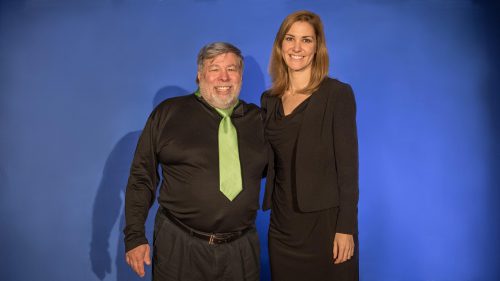“Do you know this guy with the green tie?” I ask in my workshops.

8 out of 10 people don’t.
This is Steve Wozniak—the co-founder of Apple. Yes, that Apple. The one half the world is holding in their hand right now… or typing into (I met Steve backstage at a conference in LA a long time ago, that is for another story).
“You mean Steve Jobs?” Nope. That’s the other Steve. (The one everyone knows.)
And that’s the point.
The way we are seen, heard, and respected in business – or in a negotiation – is a negotiation in itself. You can’t make someone respect you, or hear you, or trust you. That’s not how it works. Respect is earned. And it lives solely in the eyes of the people looking at you.
We feel the lack of it, sometimes acutely – especially as young negotiators, as female attorneys, or as junior members of a team. It can feel like invisibility. And it affects your negotiations more than you think.
When You’re Not Respected, It Shows
If people don’t respect you, they won’t listen. If they don’t see your value, they won’t give you value – no matter how good your arguments are. Even if you’re the best negotiator in the room, you won’t get the raise, the deal, or the influence you deserve.
And this is where charisma comes in.
Enter: Cues – and the Science of First Impressions
I recently came across a brilliant book: Cues by Vanessa Van Edwards. She breaks down charisma into something you can actually work on—by understanding how people perceive you.
According to research out of Princeton, 82% of a (first) impression is shaped by two traits: Warmth and Competence.
Think of it like this:
- Warmth = Can I trust you?
- Competence = Can I rely on you?
Highly charismatic people hit the sweet spot. They signal both. That’s what puts them in what Vanessa calls the Charisma Zone. Steve Jobs often gets perceived as that on stage.
The Charisma Zone
When you communicate with both warmth and competence, you’re seen as:
- Trustworthy and capable
- Friendly and smart
- Approachable and impressive
And the beauty? There’s no one way to get there.
A study in Cues compared the communication styles of Oprah Winfrey and Margaret Thatcher. Polar opposites – but both deeply charismatic.
- Oprah leans on the warm side: expressive, emotional, quick to connect. But she grounds it with competence – listening intently and asking sharp, challenging questions.
- Margaret Thatcher, the former UK Prime Minister, projected strength and control: steady voice, sharp pauses. But she balanced it with open body language and a steady gaze – subtle warmth that earned trust.
Same goes for Jamie Oliver and Gordon Ramsay. Totally different “flavors,” but both charismatic in their own right.
What Happens When You’re Too Much of One?
The challenge:
Most of us have an imbalance of Warmth v. Competence cues.
High Warmth, Low Competence
- You’re seen as friendly, trustworthy, likeable.
- But maybe not taken seriously. Interrupted more. Less respected.
Think: the kind colleague who everyone loves and trusts, but who is more likely to get overlooked. OR: Steve Wozniak.
High Competence, Low Warmth
- You’re impressive, powerful, and capable.
- But people hesitate to open up. You’re seen as cold or hard to read.
Think: Zuckerberg. Anna Wintour. Maybe even Hillary Clinton.
They come off as brilliant, but not necessarily approachable. And that hurts connection—especially in negotiation, where trust matters.
Got someone in your life who’s all competence? You know the type.
The Danger Zone
And then there’s the worst zone of all: Low warmth and low competence.
This is the zone of being overlooked, dismissed, or underestimated. It often happens not because we are less capable – but because we’re not signaling enough.
We go there when we’re anxious, unsure, or in full-blown panic mode. We shut down. We freeze. We stop making eye contact. Or we ramble and over-explain.
It’s a fear cycle: Fear of being rejected → under-signal → people overlook you → more fear → repeat.
Van Edwards calls this the hidden cause of social friction.
Even doctors rated low on warmth were found more likely to be sued for malpractice. (Not because they made more mistakes—but because patients didn’t feel connected or cared for.)
Where Are You on the Charisma Scale?
There’s a way to find out.
Try this 18-question Charisma Diagnostic (by Vanessa Van Edwards): 👉 Take the test here
You’ll get your personal charisma profile via email—and a chart to mark where you land on the warmth/competence map.
Building Charisma in Negotiation
Charisma isn’t some magical gift you either have or don’t. It’s a skill—a set of cues you can learn to use.
And it matters.
In negotiation, it’s not just what you say—it’s how you make people feel.
Do they trust you?
Do they believe you’re capable?
Are they comfortable collaborating with you?
If not, your message might not land—even if it’s the best message in the room.
But the good news? You can change that. You can train that.
And when you do, everything shifts. Get “Cues” today and start working on yours.
To your negotiation success!
Your Negotiation Whisperer
If you enjoyed this content, join our free 10-week Email course on the fundamentals of Collaborative and Competitive Negotiation skills by clicking HERE.
Each week, you will get a bite-size email unpacking some of the most fundamental negotiation concepts that you can apply in your everyday negotiations, along with an insight video and book recommendation to go further in areas you want to learn more about.
Want to learn more about effective preparation and how you can beat even more senior negotiators? Joining one of our online courses or organizing a tailor-made live training session for your organization will put you en par with over 10,000 leading lawyers from Fortune 100 companies to Tier 1 law firms globally.
Reach out to me at claudia@necademy.com to discuss!


